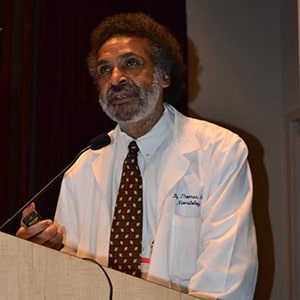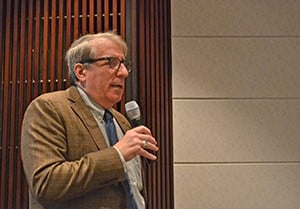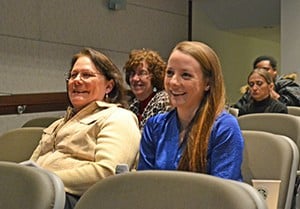Event Educates on LGBT Health Care Needs
| 
Billy Thomas, M.D., vice chancellor for diversity and inclusion, gives an overview of LGBT health and health care.

Harvey Makadon, M.D., director of the National LGBT Health Education Center at The Fenway Institute in Boston and professor of medicine at Harvard Medical School, spoke on “Taking a History of Sexual Health – Recognizing the Risk.”

UAMS student Katy Allison (right), guest and speaker at the conference, asks Makadon a question during his presentation.
Jan. 17, 2014 | The lesbian, gay, bisexual and transgender (LGBT) community is under more stress than any other population, Billy Thomas, M.D., vice chancellor for diversity and inclusion, told physicians, students and guests at a recent conference hosted by UAMS.
Several factors cause this stress, including lack of access to sufficient health care, Thomas said during the conference, called “Providing Optimal Health Care for LGBT Patients” held Jan. 16 in the UAMS Winthrop P. Rockefeller Cancer Institute Walton Auditorium. The event was an opportunity for primary care physicians to better understand how to address the health care needs of LGBT patients.
“So many health problems in the LGBT community point back to social influences at home, work and social life,” Thomas said. “There is discrimination across the entire life cycle of an LGBT person.”
Jeanne Heard, M.D., Ph.D., UAMS provost and chief academic officer, began the event with UAMS’ vision for an institution that recognizes and responds to the needs of LGBT patients.
“We are educating all 2,800 UAMS students to be prepared to serve a diverse population,” she said. “We are dedicated to providing a healthy environment for patients and students. With the patient- and family-centered care model, we put the patient in the center and they define who their family is.”
Thomas presented an overview of LGBT health and health care, which included the measures that the UAMS Center for Diversity Affairs and the new student-led LGBT Health Alliance are taking to prepare students for caring for diverse patients. This includes working with all UAMS colleges to design teaching curriculum, and with the UAMS Medical Center to provide domestic partner benefits to employees.
Thomas introduced keynote speaker Harvey Makadon, M.D., director of the National LGBT Health Education Center at The Fenway Institute in Boston and professor of medicine at Harvard Medical School, who spoke on “Taking a History of Sexual Health – Recognizing the Risk.”
“In general, patients want to talk about their sexual health concerns to doctors, but clinicians are not always that comfortable doing this,” Makadon said. “We have to bring these two issues together.”
Makadon introduced strategies on how physicians can make sure LGBT patients are understood in clinics and that they have appropriate access to health care such as HIV screenings.
“What do we do to get to know about patients in clinical settings?” he asked. “It’s important that we use inclusive language, and all patients should be asked questions like, ‘Do you have a wife or husband or boyfriend or girlfriend?’ These types of questions should be routine for all patients so we don’t make assumptions about who we should ask and who we shouldn’t ask.”
Discrimination and stigmatization in the LGBT community can keep patients from opening up about their personal lives, Makadon said.
“This happens all over the world and it affects all people either directly or indirectly,” he said. “When this happens people feel a little less comfortable opening up themselves, and it’s something to think about in terms of the environment we create.”
Sara Tariq, M.D., associate professor in the Department of Internal Medicine in the UAMS College of Medicine, spoke on patient-provider communication, and stressed that a physician should be “a vehicle for social justice” for all patients, especially in the LGBT community. She also suggested that trust should be at the center of the relationship between a patient and a doctor, and doctors should expand on the traditional communication model by making trust and psychological safety central.
“In the LGBT community, the socioeconomically disadvantaged and ethnic minorities, trust is very fragile,” Tariq said. “There are competing factors such as cost containment, the legal climate, consumerism, and reimbursement issues. I think that for us to better care for all of our patients, particularly LGBT patients, we have to really focus on building trust and meeting patient expectations.”
The conference included several panel discussions featuring Daniel Knight, M.D., chair of the Department of Family and Preventive Medicine in the UAMS College of Medicine; Gary Wheeler, M.D., branch chief of infectious diseases for the Arkansas Department of Health; Katy Allison with the Center of Diversity Affairs’ Safe Zone Committee; Kate Stewart, M.D., professor in the Department of Health Policy and Management in the UAMS College of Public Health; Shannon Starr, M.D., assistant professor of clinical medicine in the Department of Family Medicine at Louisiana State University; Jeffery Neal, M.D., from the Department of Psychiatry in UAMS College of Medicine; and Craig Wilson, director of Access to Quality Care at the Arkansas Center for Health Improvement.
The event was sponsored by the UAMS Center for Diversity Affairs, Arkansas Primary Care Association and The Fenway Institute. The event was captured on video and, along with PowerPoint presentations and other references, will be available at cda.uams.edu.